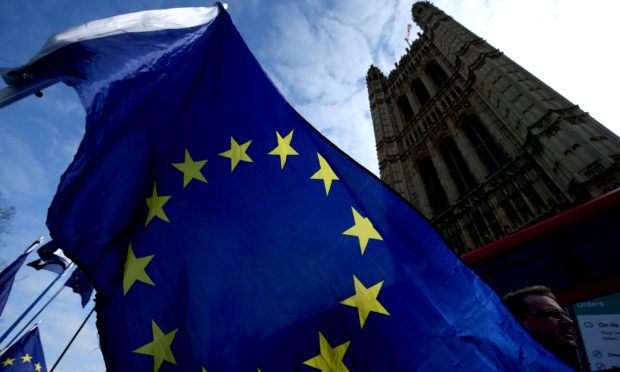This is going to be an interesting week.
There are some people, who since June 2016 have acted as if our separation from the European Union is akin to a divorce.
Last Tuesday I was invited out with a contingent of Scottish journalists to the European Commission to meet, possibly for the last time, commissioners and civil servants working in Brussels.
They were, for the most part, keen to talk about the future of the Union – employment rights, freedom of movement, applications from states including North Macedonia and Albania and most prominently the new European Green Deal.
Brexit, well it is not even a word the eurocrats use anymore. Now, the talk is of the Future Relationship with the UK – or FRUK.
Scotland’s membership should it gain independence? Safe to say it has scarcely crossed the minds of those operating the continental juggernaut’s gears and levers.
So, if we have to compare it to a divorce, the EU is doing a rather good job of keeping a stiff-upper lip.
What the UK had with the EU was truly special. No country before, and certainly no country after, will be able to be part of a large network of interconnected – yet judicially and sovereign independent – member states with the benefits the UK enjoyed.
An opt-out of the Euro, of the border-free Schengen area and a Vito on large centralised directives will not exist again. For anyone.
Should Brexit prove a disaster and we come back to Brussels in a decade or two, tail between our legs, we will not get what we had before.
Similarly, should Scotland become independent and apply for EU membership, there is no guarantee it would take anything less than 10 years for a deal to be reached. Again, we would not join with membership as we have it now.
In that, we would have but no option to join the Euro (having first set up a central bank) according to at least two officials who briefed us last week. Directives laid out by Brussels would have to be enforced by the Scottish Government.
The SNP, which argues until it is blue in the face the constraints it faces in government currently are the result of Westminster wants to – under its current leader – join a larger union which could impose similar, if not the same, set of rules. It is no surprise then, there is a swell of nationalists who want nothing to do with the EU.
Those involved with the upcoming trade negotiations are under no illusion the withdrawal part of Brexit should have been the easiest part.
As of this coming Saturday, we enter the transition period negotiated by then-Prime Minister Theresa May. This keeps us in alignment (which for the majority of us, means we can fly or enter the EU without hitch, much like we do now) until December 31.
Not content with one additional Brexit deadline, there is also the option to extend the transition period, which would have to be done by July 1. But any trade deals we would want to come into force, would for the most part, not be able to be completed until after the transition period has come to an end.
As well as having to organise new trade arrangements, security agreements will need to be settled in that time.
As pointed out by the Institute for Government, the Conservative manifesto “suggested it was aiming for a relatively loose free trade agreement that would see Great Britain leave the single market and the customs union – and did not mention anything on security cooperation”.
This was pointed out to us during a meeting with the former head of cabinet to the UK’s last commissioner, Sir Julian King.
The UK, as of February 1, becomes a third country. We are still allies, but not partners.
Access to a brand-new database detailing some of the world’s worst criminals and terrorists will be restricted. Access during the transition period will be arranged, but efforts to remove UK contributions from the data portal will have to be carried out to placate GDPR. Those who wish to do us harm will see it as a win. We can only hope this can be ironed out, quickly and efficiently.
Brussels of course, prides itself on being the European epicentre of beer (Prague, Berlin and even London might have a lot to say about that) and as with most trips, it is in bars and restaurants more temperate opinions can be taken.
Bar chats with our European cousins these last few years has focused on nothing but Brexit.
Even if those in the confines of the Commission and Parliament remain stoic, there is still some semblance of loss – or an upset at what is to come – at regulars willing to discuss the situation.
One tells me, between gallons of wheat-beer, how unsettling it feels for such a prominent ally like the UK to be leaving. Least of all because of how the UK is viewed internationally.
“Belgium is a small country, but part of something bigger. Still, with the UK as part of the EU, it feels better than it will do next week,” he tells me.
As any child of divorce will recognise, separation anxiety is a natural way to feel preceding any split and it is almost reassuring some at least on the continent are sharing in the mutual existential insecurity.
Stepping into February 1 for some will feel like a re-birth and to others as if a limb has been lost.
A step into sun-lit uplands or an undiscovered country aside, there is still a heap of work to be done, for all our sake.
To paraphrase one cigar-chomping, pro-European parliamentarian, this isn’t the end, or even the beginning of the end. It is the end of the beginning.
